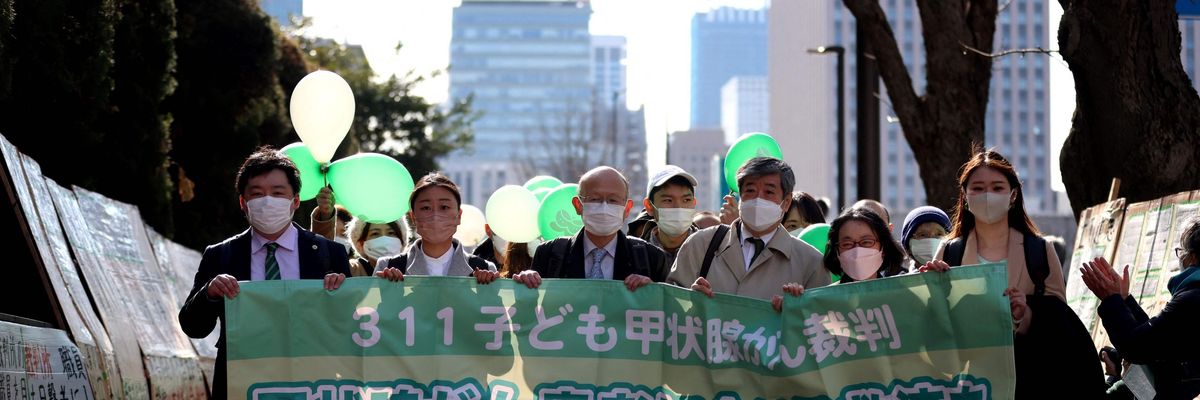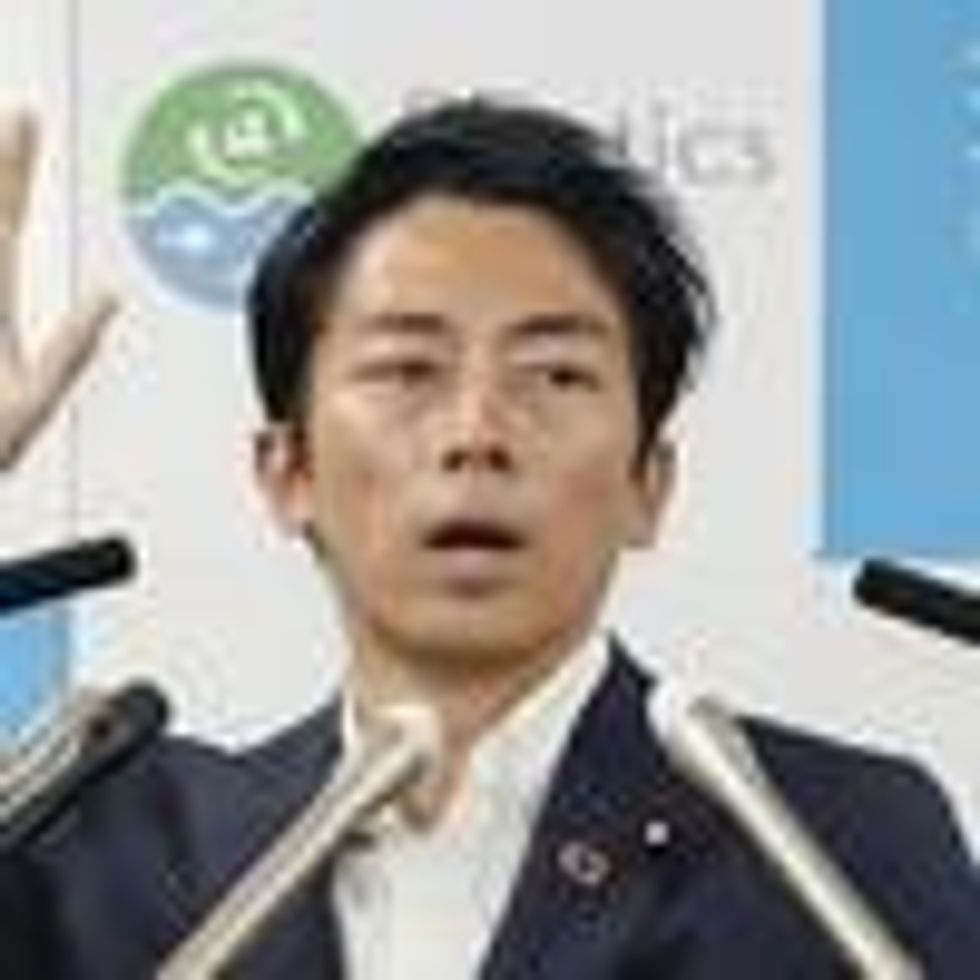
Supporters and lawyers of the six young people who were living in the Fukushima region when the March 11, 2011 tsunami caused the nuclear disaster, arrive in front of the Tokyo district court in Tokyo on January 27, 2022, to file a class-action lawsuit against plant operator Tokyo Electric Power Company (TEPCO) over claims they developed thyroid cancer due to exposure to radiation. (Photo: Beyrouz Mehri/AFP via Getty Images)
Cancer Patients File Landmark Suit Over Fukushima Disaster
Some of the plaintiffs in the newly filed case "have even given up on their dreams for their future," said one of their lawyers.
Six people--aged 6 to 16 years old at the time of the Fukushima meltdown--filed a lawsuit Thursday against the Tokyo Electric Power Company, demanding millions in compensation for thyroid cancer they say is a direct result of radiation from the 2011 nuclear disaster.
"Some plaintiffs have had difficulties advancing to higher education and finding jobs, and have even given up on their dreams for their future," Kenichi Ido, the lead lawyer in the class action lawsuit, told Agence France-Presse.
The lawsuit against TEPCO was filed in the Tokyo District Court. The plaintiffs, who all lived in the Fukushima region at the time of the disaster and were diagnosed with thyroid cancer between the ages of 12 and 18, are demanding 616 million yen ($5.4 million) in compensation.
According to the Associated Press, four of the plaintiffs have had "their thyroid fully removed and need lifetime hormonal treatment. One of them says the cancer has since spread. The other two had part of their thyroid removed."
Lawyers for the group said it marks the first lawsuit concerning adverse health impacts from the disaster.
The world's second-worst nuclear catastrophe after Chernobyl, the Japanese disaster began to unfold in March of 2011 after an earthquake triggered a tsunami that caused the meltdown of three nuclear reactors at the Fukushima Daiichi power plant.
In 2019, a Japanese court's acquittal of former TEPCO executives accused of criminal negligence for failing to take adequate safety measures ahead of the Fukushima disaster sparked outrage. Controversy continues over the Japanese government's plans to start releasing contaminated wastewater from the nuclear plant into the sea next year.
Opponents of nuclear power have seized the disaster as an example of why such energy can never be safe.
Related Content

Japan's New Environmental Minister Calls for Closing Down All Nuclear Reactors to Prevent Another Disaster Like Fukushima
Among those critics are two former Japanese prime ministers--Junichiro Koizumi and Naoto Kan--who on Thursday urged the European Union to reject nuclear power as part of any "green energy" transition designed to address the climate crisis.
Koizumi, who held office from 2001 to 2006, said that because of the Fukushima accident, "we've learned nuclear power was not safe, cheap, and clean energy."
Kan, who was prime minister from 2010 and 2011, concurred.
"Even if we do not rely on nuclear power and not use fossil fuels, there are enough renewables to supply the needed power," he said at a press conference. "This is true in Japan as well as other countries in the world."
An Urgent Message From Our Co-Founder
Dear Common Dreams reader, The U.S. is on a fast track to authoritarianism like nothing I've ever seen. Meanwhile, corporate news outlets are utterly capitulating to Trump, twisting their coverage to avoid drawing his ire while lining up to stuff cash in his pockets. That's why I believe that Common Dreams is doing the best and most consequential reporting that we've ever done. Our small but mighty team is a progressive reporting powerhouse, covering the news every day that the corporate media never will. Our mission has always been simple: To inform. To inspire. And to ignite change for the common good. Now here's the key piece that I want all our readers to understand: None of this would be possible without your financial support. That's not just some fundraising cliche. It's the absolute and literal truth. We don't accept corporate advertising and never will. We don't have a paywall because we don't think people should be blocked from critical news based on their ability to pay. Everything we do is funded by the donations of readers like you. Will you donate now to help power the nonprofit, independent reporting of Common Dreams? Thank you for being a vital member of our community. Together, we can keep independent journalism alive when it’s needed most. - Craig Brown, Co-founder |
Six people--aged 6 to 16 years old at the time of the Fukushima meltdown--filed a lawsuit Thursday against the Tokyo Electric Power Company, demanding millions in compensation for thyroid cancer they say is a direct result of radiation from the 2011 nuclear disaster.
"Some plaintiffs have had difficulties advancing to higher education and finding jobs, and have even given up on their dreams for their future," Kenichi Ido, the lead lawyer in the class action lawsuit, told Agence France-Presse.
The lawsuit against TEPCO was filed in the Tokyo District Court. The plaintiffs, who all lived in the Fukushima region at the time of the disaster and were diagnosed with thyroid cancer between the ages of 12 and 18, are demanding 616 million yen ($5.4 million) in compensation.
According to the Associated Press, four of the plaintiffs have had "their thyroid fully removed and need lifetime hormonal treatment. One of them says the cancer has since spread. The other two had part of their thyroid removed."
Lawyers for the group said it marks the first lawsuit concerning adverse health impacts from the disaster.
The world's second-worst nuclear catastrophe after Chernobyl, the Japanese disaster began to unfold in March of 2011 after an earthquake triggered a tsunami that caused the meltdown of three nuclear reactors at the Fukushima Daiichi power plant.
In 2019, a Japanese court's acquittal of former TEPCO executives accused of criminal negligence for failing to take adequate safety measures ahead of the Fukushima disaster sparked outrage. Controversy continues over the Japanese government's plans to start releasing contaminated wastewater from the nuclear plant into the sea next year.
Opponents of nuclear power have seized the disaster as an example of why such energy can never be safe.
Related Content

Japan's New Environmental Minister Calls for Closing Down All Nuclear Reactors to Prevent Another Disaster Like Fukushima
Among those critics are two former Japanese prime ministers--Junichiro Koizumi and Naoto Kan--who on Thursday urged the European Union to reject nuclear power as part of any "green energy" transition designed to address the climate crisis.
Koizumi, who held office from 2001 to 2006, said that because of the Fukushima accident, "we've learned nuclear power was not safe, cheap, and clean energy."
Kan, who was prime minister from 2010 and 2011, concurred.
"Even if we do not rely on nuclear power and not use fossil fuels, there are enough renewables to supply the needed power," he said at a press conference. "This is true in Japan as well as other countries in the world."
Six people--aged 6 to 16 years old at the time of the Fukushima meltdown--filed a lawsuit Thursday against the Tokyo Electric Power Company, demanding millions in compensation for thyroid cancer they say is a direct result of radiation from the 2011 nuclear disaster.
"Some plaintiffs have had difficulties advancing to higher education and finding jobs, and have even given up on their dreams for their future," Kenichi Ido, the lead lawyer in the class action lawsuit, told Agence France-Presse.
The lawsuit against TEPCO was filed in the Tokyo District Court. The plaintiffs, who all lived in the Fukushima region at the time of the disaster and were diagnosed with thyroid cancer between the ages of 12 and 18, are demanding 616 million yen ($5.4 million) in compensation.
According to the Associated Press, four of the plaintiffs have had "their thyroid fully removed and need lifetime hormonal treatment. One of them says the cancer has since spread. The other two had part of their thyroid removed."
Lawyers for the group said it marks the first lawsuit concerning adverse health impacts from the disaster.
The world's second-worst nuclear catastrophe after Chernobyl, the Japanese disaster began to unfold in March of 2011 after an earthquake triggered a tsunami that caused the meltdown of three nuclear reactors at the Fukushima Daiichi power plant.
In 2019, a Japanese court's acquittal of former TEPCO executives accused of criminal negligence for failing to take adequate safety measures ahead of the Fukushima disaster sparked outrage. Controversy continues over the Japanese government's plans to start releasing contaminated wastewater from the nuclear plant into the sea next year.
Opponents of nuclear power have seized the disaster as an example of why such energy can never be safe.
Related Content

Japan's New Environmental Minister Calls for Closing Down All Nuclear Reactors to Prevent Another Disaster Like Fukushima
Among those critics are two former Japanese prime ministers--Junichiro Koizumi and Naoto Kan--who on Thursday urged the European Union to reject nuclear power as part of any "green energy" transition designed to address the climate crisis.
Koizumi, who held office from 2001 to 2006, said that because of the Fukushima accident, "we've learned nuclear power was not safe, cheap, and clean energy."
Kan, who was prime minister from 2010 and 2011, concurred.
"Even if we do not rely on nuclear power and not use fossil fuels, there are enough renewables to supply the needed power," he said at a press conference. "This is true in Japan as well as other countries in the world."

